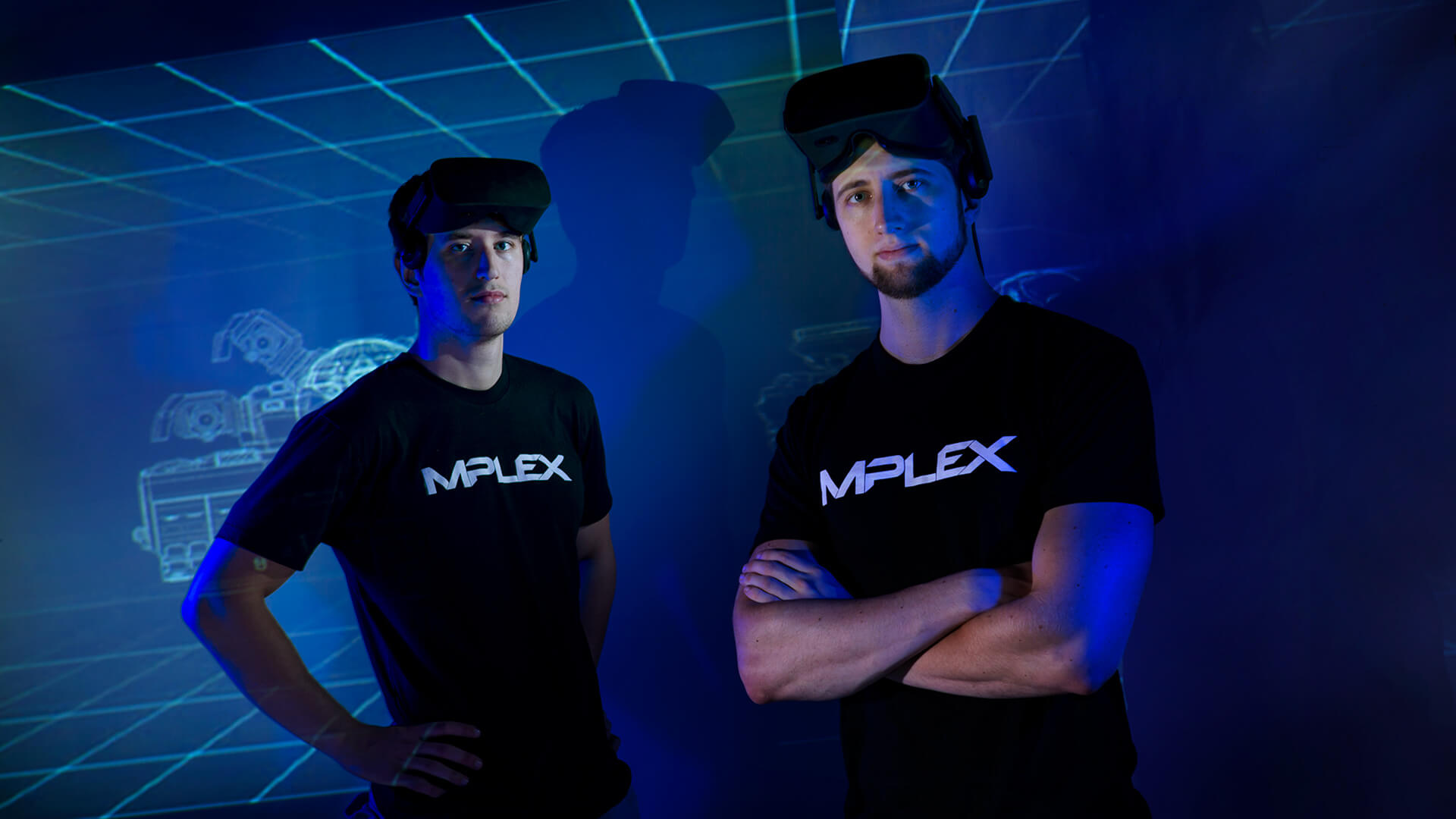- September 25, 2019
- By Maya Pottiger ’17, M.Jour. ’20
Rumbling across a dark landscape, an enemy tank appears in the distance. Your heart rate picks up, and as you take aim, preparing to destroy the intruder … you can’t take another second of this.
You pull off your VR mask, the battlefield fading away as your living room materializes in front you, and take deep breaths, fighting nausea.
Simulation sickness affects the majority of VR users, but virtual reality gaming doesn’t have to end with losing your lunch. Two Terps, Mike Sorokin ’18 and Galen Stetsyuk ’20, are working to combat nausea in this realm as they develop “Core Disruption,” which they hope will be the first commercial video game released by their company, MPLEX.
“Our goal with MPLEX is to realize the full potential of immersive technologies,” Stetsyuk said. “(VR is) bringing millions of people to a new platform; it’s not something that’s ever easy.”
Sorokin and Stetsyuk trace their interests in game development to their childhoods: In middle school, Sorokin started hacking into servers for popular multiplayer online games to get experience with coding languages. Similarly, Stetsyuk focused on ways he could’ve improved the games he was playing.
 The pair met as freshmen in 2014, and quickly recognized their mutual interests in gaming and computer science. Soon, they started attending hackathons together, and after UMD alum and Oculus VR co-founder Brendan Iribe donated VR headsets to the university, Stetsyuk and Sorokin became interested in VR’s surging potential. That year, they founded MPLEX, a virtual reality entertainment company. Stetsyuk is the CEO and Sorokin is the CTO.
The pair met as freshmen in 2014, and quickly recognized their mutual interests in gaming and computer science. Soon, they started attending hackathons together, and after UMD alum and Oculus VR co-founder Brendan Iribe donated VR headsets to the university, Stetsyuk and Sorokin became interested in VR’s surging potential. That year, they founded MPLEX, a virtual reality entertainment company. Stetsyuk is the CEO and Sorokin is the CTO.
(And the name MPLEX? It’s a “complex of M’s,” Stetsyuk said—a combined reference to Maryland, the first letter of Sorokin’s given name, “Mike,” the initial of another partner who has since left, and the first letter of Marcus, the moniker Stetsyuk planned to assume. The name change plan fizzled, but the company name stuck.)
In June, the pair received $250,000 in seed funding from businessman and philanthropist Robert Hisaoka '79, with investment covering new equipment and staff for the company.
They’re not the first game developers to attack the problem of virtual reality sickness, which could limit consumers’ willingness to buy into the technology that many believe could be the next big wave in entertainment.
Even when using high-quality VR technology, Stetsyuk himself still experiences simulation sickness. Proposed solutions have included limiting players’ in-game movement, or constrict their field of vision. Both negatively impact gameplay, Stetsyuk said; MPLEX’s solution is different.
“We actually have a pretty clever way of handling the different types of movement in such a way that the environment reflects your real-world environment,” Stetsyuk said. “If you’re sitting upright in your living room, we want to make sure that in the game world, you’re always in an upright position, even when you’re on a tilted axis on a vehicle, like if you’re going up or down a hill.”
Holly DeArmond, managing director of the Dingman Center for Entrepreneurship, said Sorokin and Stetsyuk have a clear vision for addressing the problem from scientific and business standpoints.
“Not only are they committed to the business, they want Maryland to be a leader, and they want the students here to be educated and experts in this area,” she said.
As they work to launch their own game, Sorokin and Stetsyuk are trying to create opportunities for fellow Terps as well.
The pair founded the VR Club on campus, which grew to 300 members in its first year. (It has since merged with the AR Club to form the XR Club.) Last semester, they also taught a Student-Initiated Course on game development, which included some of the techniques they’ve discovered for reducing simulation sickness.
Lucien Parsons, director of the Mixed/Augmented/Virtual Reality Innovation Center (MAVRIC) on campus, has helped guide Stetsyuk and Sorokin over the last few years. Parsons has 15 years of experience as a video game developer, and he said it has been gratifying to watch MPLEX find its direction and see its success.
“What they are trying to do is very hard,” Parsons said, “and they have been open to constructive criticism and to learning from their mistakes, which is a huge part of building that first game.”
